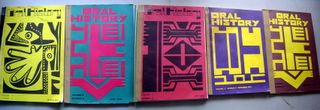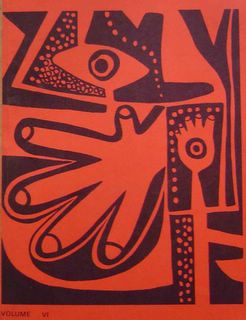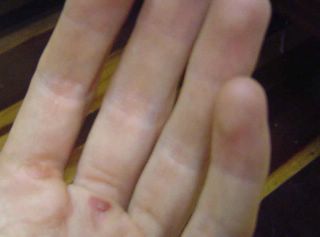
in the 1970s and first half of the 80s, journals flourished in png. and not just in terms of numbers or content - but covers! exciting and vibrant work was going on.

found out one of my mates has managed to sneak in through a side door and get a bit of work writing for our hometown tabloid. i am wildly jealous! how fantastic to see it all in action. (i wonder if she'll spot samela...) i am doing my own bit of reportage, on the gun control summit held here next week. i had low expectations, but i know some people who've done some work towards it and it might, afterall, be more than a boring talk fest. we'll see. i'll be there in an official work capacity: i need to take photos of big wigs and write a report for one of our publications. almost want to ask for a press pass - but that's being cheeky. must take new role as intelligent, tough and pretty girl reporter in wild and dangerous country more seriously.

(kite festival, semaphore, sa, 200...2?)
we have lingered in the chambers of the sea // By seagirls wreathed with seaweed red and brown // Till human voices wake us, and we drown
(funabashi this is a bit battered, but it's come with me. & thanks for the postcard! it's not a letter a week, but a nice collection's forming on my wall)

my rusty old bush knife
See this fellow? Can be lethal. There was a bit of a commotion in my neighbourhood last Friday. A friend was walking home, saw the crowd, went up to see what was going on and – too late, action over – there was a lot of blood and underneath that a dead woman. I heard the story at work on Monday; it goes something like this:
X has two wives. Friday he learns the father of his second wife – a Chimbu woman – has died; he joins her male relatives, they’re raising money for a coffin, planning the trip up to Chimbu etc. First wife – a Lufa lady – hears about this on Friday afternoon. She’s on the main road out in the town’s west (an area which has a little bit of a reputation, but isn’t too bad); she sees wife number two and whether or not there are words is unclear. But wife number one’s upset that her husband’s forgotten her in all the commotion. She goes into a store and buys a bushknife (newer and sharper than mine), comes straight back out and stabs the Chimbu woman several times. It’s quick, and the latter is soon dead.
But at work I laughed when someone made a quip about jealous wives. And that it’s lucky we’re not on a connecting road between Lufa and Chimbu, because there’s bound to be payback. And when I found out that within minutes people were trying to hail a pmv to take the body to the morgue (that’s a public bus). (I wonder if one stopped, who’d want a bloody carcass on board? And wouldn’t that suck: dead, shoved onto a pmv: going out with no style at all.)
Only writing this down I realise I’ve lost my sensitivity to these things. Should I be alarmed? Where is my empathy? Is this lack of…response, good or bad?
I suspect it’s nothing to do with either. It’s more like adaptation, getting accustomed to the rhythms of lives here, adjusting to their own cultural logic, rather than expecting to find your own. and no jokes about strange mutations. though they're possible too. least i won't have any trouble on the lethal wives front.